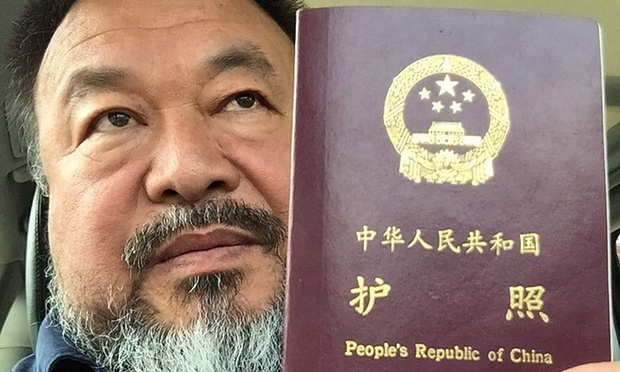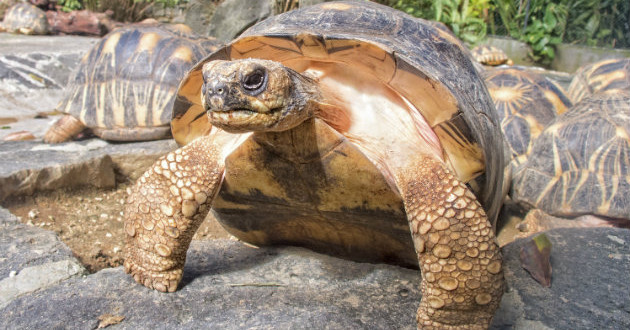Wednesday 22nd July 2015Ai Weiwei's Passport Finally Returned
It's been something of a rollercoaster ride for Chinese artist and activist Ai Weiwei over the past few years. He's launched numerous art exhibitions around the world, had documentaries made about him and his struggles with the Chinese government, and been generally celebrated around the world as a rising star in the art world, but back home, the Chinese authorities have seemed less than enamoured. After being temporarily disappeared back in 2011 by the secret police, questioned repeatedly and subjected to psychological tortures, he was finally released - but without his passport. It was kept by the government to ensure that they could keep an eye on him, and he couldn't flee the country and become an external force for destabilizing the ruling leaders. It was a difficult time for the Communist regime, which was in the middle of a serious crackdown on political activists.
Finally, however, it appears that government sentiment towards Mr. Ai has softened, as today he received it back from the police, as evidenced by the Instagram photo he posted earlier showing the travel document. "When I got it back I felt my heart was at peace. I feel pleased. This was something that needed to be done. I was quite frustrated when my right to travel was taken away but now I feel much more positive about my condition. I think they should have given it back some time ago – and maybe after so many years they understand me better.”
There was a huge outpouring of support on social media as Ai posted his passport selfie, both from within China and around the world. Even some of the Chinese tabloids that are typically pro-Beijing were questioning whether or not it was time to move on from the whole debacle. Curiously, however, this move comes amidst yet another political crackdown throughout China, both regarding human rights and other political activism.
Unfortunately, as a prominent human rights attorney noted on Twitter, "“Congratulations Mr Ai Weiwei on getting your passport back. But having a passport doesn’t mean you can get out of China freely." The Chinese government is notoriously strict about controlling the movements of its citizens in and out of the country, but it seems that Mr. Ai will likely be granted his wish. Congratulations!
Posted on July 22nd 2015 on 04:17pm
0 Comments
Wednesday 20th August 2014Art Animals

We sure do seem to get the strange ones, don't we? Just after we posted our recent Artist Spotlight on Cai Guo-Qiang, a piece caught our eye from the very same artist, although with a slightly more argumentative tone than our own. The famous Chinese artist has recently debuted an installation piece at the Aspen Art Museum in Colorado, and it's not the ire of the Chinese government he's aroused this time, but rather that of some American animal rights activists. The installation piece, has some rather unexpected components: namely, three tortoises. Three tortoises with Apple iPads attached to their backs. Yes, you read that correctly.
The piece is entitled 'Moving Ghost Town', and the tortoises wander around with the iPads in tow throughout the rooftop sculpture garden, a feature of the museum which has been added as part of a $45 million dollar building that has recently opened, designed by celebrated Japanese architect Shigeru Ban. The tortoises are African Sulcata tortoises, and they appear to be in perfect health, despite the protestations of the animal rights activists who want the trio of tortoises to be trucked towards a shelter. However, it has transpired that the three were rescued (though from what is not mentioned) from an Arizona breeder, meaning all are captive-bred and not wild caught specimens. The tortoises are regularly checked by an accomplished veterinarian on a regular basis, and the local Turtle Conservancy has apparently been consulted as well.
And so what, do you ask, are the iPads showing, exactly? They're showing footage of three ghost towns - film that was shot by the tortoises themselves. Or, rather, shot by cameras mounted on them as they wandered through the empty streets and decaying buildings under the watchful eye of Cai Guo-Qiang. Presumably, the cameras were mounted using the same non-toxic silicone adhesive that is used to hold the current iPads in place, as it leaves no residue and causes no damage to the shells once removed. The animals appear to be in perfect health, as the negligible amount of weight to carry doesn't inconvenience them in the slightest.
Regardless, it's interesting to see how this will play out. Art and activism often go hand in hand so regularly, it will be curious to see what happens when they come to blows. A petition from concerned activists has gathered over 1000 signatures at the time of writing, but the Aspen Art Museum seems unmoved, and simply appreciates the extra publicity!
Posted on August 20th 2014 on 03:04am
0 Comments
 It's been something of a rollercoaster ride for Chinese artist and activist Ai Weiwei over the past few years. He's launched numerous art exhibitions around the world, had documentaries made about him and his struggles with the Chinese government, and been generally celebrated around the world as a rising star in the art world, but back home, the Chinese authorities have seemed less than enamoured. After being temporarily disappeared back in 2011 by the secret police, questioned repeatedly and subjected to psychological tortures, he was finally released - but without his passport. It was kept by the government to ensure that they could keep an eye on him, and he couldn't flee the country and become an external force for destabilizing the ruling leaders. It was a difficult time for the Communist regime, which was in the middle of a serious crackdown on political activists.
It's been something of a rollercoaster ride for Chinese artist and activist Ai Weiwei over the past few years. He's launched numerous art exhibitions around the world, had documentaries made about him and his struggles with the Chinese government, and been generally celebrated around the world as a rising star in the art world, but back home, the Chinese authorities have seemed less than enamoured. After being temporarily disappeared back in 2011 by the secret police, questioned repeatedly and subjected to psychological tortures, he was finally released - but without his passport. It was kept by the government to ensure that they could keep an eye on him, and he couldn't flee the country and become an external force for destabilizing the ruling leaders. It was a difficult time for the Communist regime, which was in the middle of a serious crackdown on political activists. We sure do seem to get the strange ones, don't we? Just after we posted our recent Artist Spotlight on Cai Guo-Qiang, a piece caught our eye from the very same artist, although with a slightly more argumentative tone than our own. The famous Chinese artist has recently debuted an installation piece at the Aspen Art Museum in Colorado, and it's not the ire of the Chinese government he's aroused this time, but rather that of some American animal rights activists. The installation piece, has some rather unexpected components: namely, three tortoises. Three tortoises with Apple iPads attached to their backs. Yes, you read that correctly.
We sure do seem to get the strange ones, don't we? Just after we posted our recent Artist Spotlight on Cai Guo-Qiang, a piece caught our eye from the very same artist, although with a slightly more argumentative tone than our own. The famous Chinese artist has recently debuted an installation piece at the Aspen Art Museum in Colorado, and it's not the ire of the Chinese government he's aroused this time, but rather that of some American animal rights activists. The installation piece, has some rather unexpected components: namely, three tortoises. Three tortoises with Apple iPads attached to their backs. Yes, you read that correctly.



